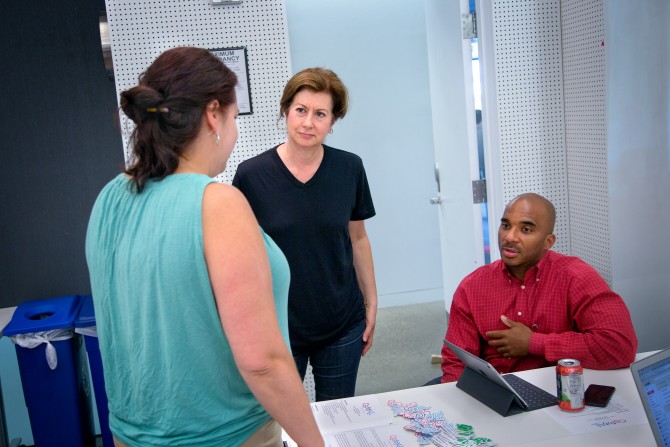Cornell Tech fortifies computer science ed in Ithaca area
By Susan Kelley
School districts in and around Ithaca, New York, face a crucial challenge: how to integrate computer education into the school day.
Cornell Tech is helping address that problem.
At a workshop Aug. 8-9 in Gates Hall, Cornell Tech helped eight local school districts and a cooperative educational service agency begin to create their own K-12 computer science education strategies. The event was part of a two-year process, the ultimate goal of which is for each district to integrate computer science education throughout the entire school day.
“We appreciate this program because it’s allowing us to take an intentional look at something that we think is going to provide opportunities for our students,” said participant Jeff Kisloski, superintendent of the Candor Central School District.
Added Diane Levitt, Cornell Tech’s senior director of K-12 education, who convened the workshop: “If we don’t equip our students to be citizens of a digital world, we haven’t done our job to prepare them for college, career, democracy, adulthood.”
The event was an outgrowth of similar work Cornell Tech does with New York City schools in conjunction with the CSforAll Consortium, which works to enable all U.S. students in grades K-12 to achieve computer science literacy as an integral part of their education. Leigh Ann DeLyser, chief academic officer for the Consortium, explained, “The workshop was an opportunity to work with a region we have not reached before, and we were eager to share what we know about planning for CS that is rigorous, inclusive and sustainable, and to learn from the great group of district personnel who attended the workshop.”
The workshop, facilitated by CSforAll, included an overview of computer science education, standards and resources. And each district’s team – superintendents, principals and teachers – created a vision of a computer science strategy in their respective districts, with three- and six-month goals.
The standards overview – and how to integrate them into traditional subjects – was most helpful, said Dan Breiman, principal at Belle Sherman Elementary in Ithaca. Standards include an ability to work with algorithms, for example.
“They were great at explaining how kindergartners can understand algorithms,” he said. “An algorithm is what you do in a fire drill. An algorithm is what you do when you tie your shoes. It’s a step-by-step sequence. One of the biggest things is making all this work accessible to my 5-year-olds to fifth graders – which it is.”
The process allows each district to create a strategy based on its goals, resources and challenges, Levitt said.
Jeff Matteson, superintendent of Tompkins-Seneca-Tioga Board of Cooperative Educational Services (TST BOCES), wants to focus his organization’s computer science education on workforce development skills, problem solving and equitable access to this type of education. TST BOCES serves 900 vocational, special education and alternative school students per day.
Special education students don’t always get access to computer science, he said. But they sometimes respond more readily to learning through computer science than through a traditional approach. “Sometimes, this is the hook,” he said.
That has also been the case for some students with challenging behaviors who have not participated in class. “Once we started getting them access to technology, whenever they do a lesson that involves integration of technology, they’re all in,” Matteson said.
Cornell Tech and the Consortium will follow up with each district in three months and again in six months to help them meet their strategic goals. DeLyser offered personal follow up “office hours” consultation to all districts. And there will be three more workshops.
“Thoughtful work takes time,” Levitt said. “What we don’t want is to just check a box. What we want is to change teaching and learning. It’s going to look different in every district. But everyone here is onboard.”
Cornell Tech has tentative plans for the superintendents to go to New York City this fall to visit its new Roosevelt Island campus, attend its To Code and Beyond conference and tour schools that have successfully integrated a well-articulated curriculum in computer science, some in collaboration with Cornell Tech.
“We’re going to go ask questions, so we’re not making the mistakes that they made, and we’ll capitalize on the positives and the advantages that they’ve already experienced,” Kisloski said. “For Cornell to be at the center of this, to link us directly with schools that have already been through this, is invaluable.”
Media Contact
Get Cornell news delivered right to your inbox.
Subscribe